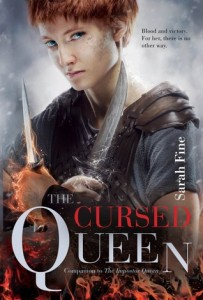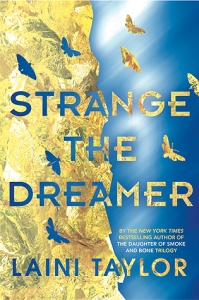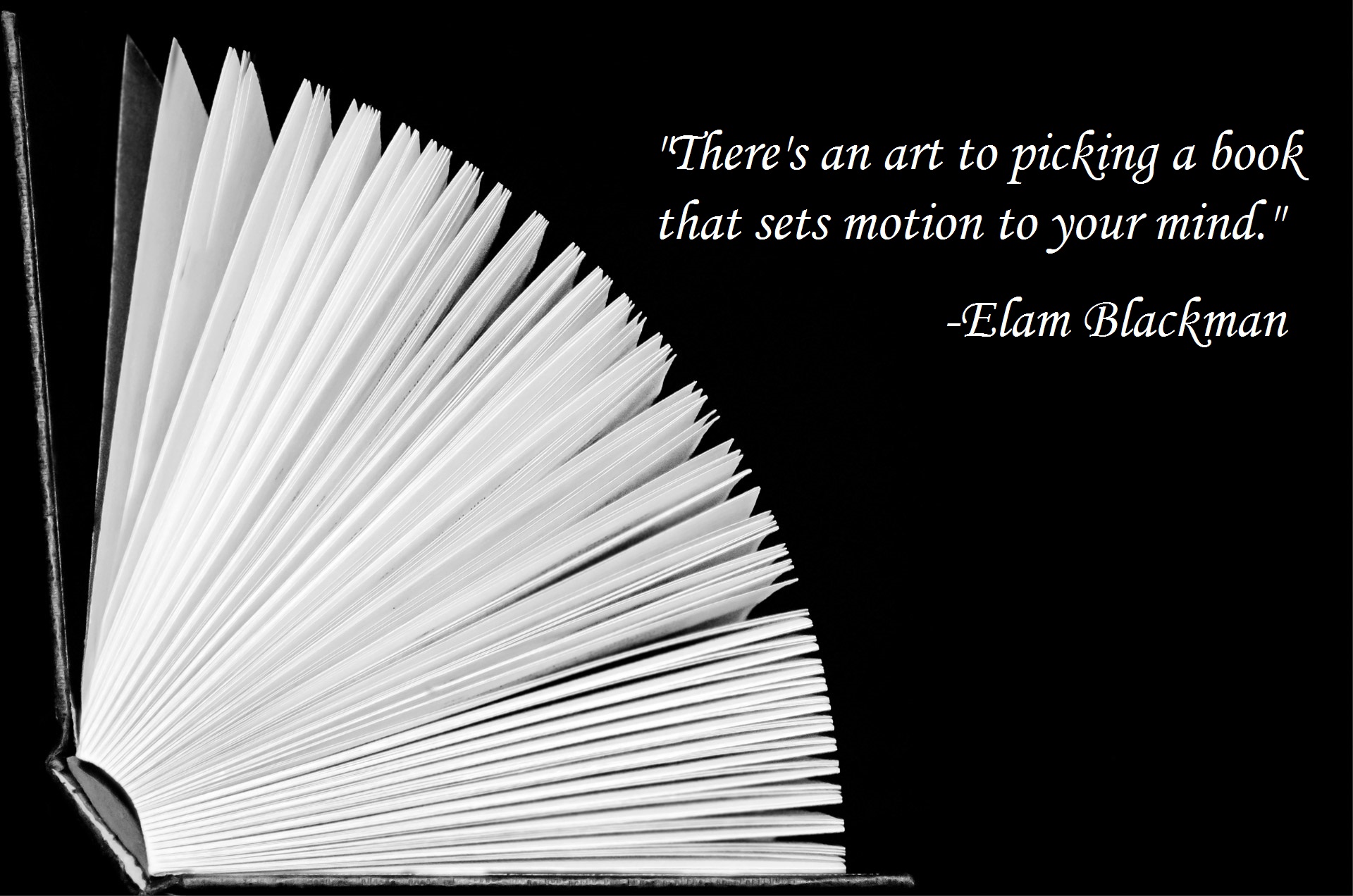My rating: 4 of 5 stars
Ratings/Reviews
Completed: The Hitchhiker’s Guide to the Galaxy by Douglas Adams
Completed: Ash by Malinda Lo
Review: The Cursed Queen by Sarah Fine (The Impostor Queen, book 2)
Ansa has always been a fighter. As a child, she fought the invaders who murdered her parents and snatched her as a raid prize. She fought for her status as a warrior in her tribe, but the day the Krigere cross the great lake and threaten the witch queen of the Kupari, everything changes.
Rating: ★★★☆☆ – liked it
Genre: young adult fiction, ya fantasy
Pros: queer protag, better than the first book, many strong women
Cons: not exciting, not enough main characters of color

The Cursed Queen is the sequel to The Impostor Queen, but the events of this book actually run almost parallel to the events of the first book, only advancing the timeline a little bit from the end of The Impostor Queen. (Which does make sense, because we would want to know what led the Valtia to meet the Astia, wouldn’t we?) I went into this book expecting to learn what happened after the rebellion of Impostor, and in that respect I was mostly disappointed.
However, the story itself was not a disappointment at all. In fact, Cursed was (in my opinion) an improvement on Impostor. The events were slightly less predictable and the pacing was better. In Imposter I spent a major portion of the book begging for something to start happening, but in this one things were happening from minute one. And even when major things weren’t happening, the intrigue and Ansa’s struggling with the curse keep things from getting too dull. There’s no real urgency, but it moves along well and it’s easy to continue reading at a steady pace.
I enjoy queer representation in my books, but I get tired of just reading books about people being afraid to come out or fighting to be accepted by family and friends for their sexuality, so this book was a welcome relief. The main character isn’t straight and a lot of background characters aren’t either, but even when there is relationship drama it has nothing to do with their sexualities.
I do wish there had been more main characters that were POC. Almost every main character is white, despite being set mostly in a city of POC (stolen by the mostly white Krigere). I’d say this is yet another one of those books that does better than others on representation, but not quite good enough.
There was a very nice scene where a black character, belonging to the subjugated city, tells a white character that while it’s cool she’s not actively trying to kill them, by not fighting back against the other white people who are subjugating the city (of black people), she’s still basically complicit and not technically a good person. Excellent scene. (I’m not going to tag this as a spoiler because it doesn’t give away any plot points.)
Despite the protag being white, this is not a White Savior story. It looks like it might be for a bit, but it turns out better. I can’t explain much without giving away major spoilers, but I’ll put it down in the Spoiler section just in case someone wants it.
The best thing about this book was the variety of strong female characters. Some are strong in family, some clever and sneaky, some fierce fighters, some good survivors. A lot of times when you say strong female character you just get a fighter, but this book showed many different ways a woman can be strong and I really enjoyed that.
It’s nice to see that Ansa is very different from Elli. You can clearly see how they could balance each other out or clash horribly (or maybe both), and I look forward to seeing them come together in The True Queen.
I recommend this book to those who liked The Impostor Queen for sure, but even if you didn’t love that one, you may like The Cursed Queen. If you are a fan of Magical YA Fantasy or, like me, crave books with queer representation that isn’t all about how hard it is to come out, you should give this book a shot.
Don’t expect to be blown away, this book isn’t amazing, but it is a good, solid, 3-star book. The draw would be the content, not the writing style.
Spoiler Zone
I have one thing I want to talk about regarding relationships that includes a pretty decent sized spoiler so only read it if you don’t mind that:
[start] I was really wary for a good half or more of the book that this was going to follow the same path of the last book relationship-wise. That is, the girl starts out with a crush on a girl, but later meets a boy who is perfect for her and falls for him instead (with possible death of the girl). It would have set a disturbing pattern of “fixing” the bi girl, but luckily that didn’t happen. [end]
Re: Not A White Savior (Seriously, this is a major spoiler, think before you read.)
[start] The people of Vasterut are black, the people of the Krigere, who took the city, are (mostly) white. In most books like this, little white Ansa would come along with her magic and rescue the subjugated Vasterutians. However, in this story, the Vasterutians have been working to free themselves before Ansa’s tribe even arrives in the stolen city. They have built allies and networks, but have hit a snag in their plans. The white Chieftain Thyra helps them, but only in a diversionary way, and ultimately it is the Vasterutians and the allies they made for themselves who free their city from Krigere control. Ansa’s actions during the revolt are solely related to her lady-love Thyra, and prior to that she was merely a pawn of the Vasterutians to help distract the Krigere. So as I said, the white people do not save or free the black people in this book. [end]
Goodreads | Book Depository | Author’s Website
Completed: The Cursed Queen by Sarah Fine
 The Cursed Queen by Sarah Fine
The Cursed Queen by Sarah Fine
My rating: 3 of 5 stars
Trigger Warning: Self-harm (cutting). The protag glorifies it along with pretty much everyone else in her tribe, but towards the end of the book she seems to have realized it’s not a good thing. However, it is never explicitly decried.
Completed: Homecoming by Cynthia Voigt (The Tillerman Cycle, book 1)
Review: Strange the Dreamer by Laini Taylor
In the aftermath of a war between gods and men, a hero, a librarian, and a goddess’ daughter must battle the fantastical elements of a mysterious city stripped of its name.
Rating: ★★★★★ – it was amazing
Genre: young adult fiction, ya fantasy
Pros: beautifully written, bibliophile mc, fascinating world, banter!
Cons: triggering Carnage descriptions, could use more diversity, no pronunciation guide

Trigger Warning: Descriptions of the Carnage include the death of infants. It doesn’t go into gory detail, it’s a little more abstract, but it’s still vivid and mentioned many times.
The world of Strange the Dreamer is interesting and dynamic. I found myself wishing to know more about the history and customs — of Weep especially, but all the other kingdoms, too. I’d love to have several more novels set there (about literally anything) so I could just live in this universe longer.
The writing is beautiful. It’s been a little while since I read one of Laini’s books so, while I remembered I liked her writing, I had forgotten just how lovely it could be. The descriptive language paints masterpieces and it’s a purely enjoyable experience for the reader.
One of the best things in the book was the banter between characters. Lazlo and company had me giggling so many times. In fact, I kept stopping to read bits of dialogue to my husband so he could enjoy it too.
The only real drawback for me was (as is often the case) the lack of diversity. This book has character descriptions that are ambiguous enough for one to decide for themselves whether many of the people are white or POC, and that is better than a lot of books in this genre. However, we know Laini Taylor loves to describe things — her descriptive language really being a major draw for her books — and we see this with her poetic depictions of the Godspawn with their blue skin. (“Blue as opals, pale blue. Blue as cornflowers, or dragonfly wings, or a spring — not summer — sky.”) So there’s no reason in the world she couldn’t have given us some explicitly diverse characters. Overall, I’d say it’s a step in the right direction for representation, but just not quite enough.
I do wish the book had included a pronunciation guide for some of the proper nouns. Nothing takes me out of a story like constantly wondering if I’m saying names correctly. Luckily, Laini’s writing drew me right back in again.
The plot is really engaging. I honestly couldn’t read fast enough! The foreshadowing was, in my opinion, done perfectly. Some books have foreshadowing that’s too obscure, some have foreshadowing that’s too obvious, but Strange the Dreamer had that perfect middle ground. I was able to predict a lot of things, but more because I was familiar with the genre than because the foreshadowing wasn’t subtle enough. And another sign it was done right? Even when I expected something, it was still completely satisfying when it happened!
If you liked Laini’s Daughter of Smoke and Bone trilogy or you’re a fan of Magical YA Fantasy, I definitely recommend reading Strange the Dreamer.
Completed: Specials by Scott Westerfeld
My rating: 4 of 5 stars
Trigger Warning: Self-harm (cutting, some passing mention of burning). Only one character really treats it like it’s a bad thing, everyone else treats it as normal and/or good for the majority of the book.
Completed: Strange the Dreamer by Laini Taylor
 Strange the Dreamer by Laini Taylor
Strange the Dreamer by Laini Taylor
My rating: 5 of 5 stars
Trigger Warning: Descriptions of the Carnage include the murder of infants. It doesn’t go into gory detail, it’s a little more abstract, but it’s still vivid and mentioned many times.
Review: Crashed by Robin Wasserman (Cold Awakening, book 2)
Living with other mechs since her wealthy parents transplanted her brain into a mechanical body to prevent her from dying in a horrible accident, Lia becomes a pawn in a religious leader’s movement to outlaw mech technology and eradicate machines such as Lia.
Rating: ★★★☆☆ – liked it
Genre: young adult fiction, ya science fiction, ya dystopia
Pros: well written, allegorical, realistic
Cons: slow paced, frustrating main character, realistic

I’m giving this book 3 stars because every problem I had getting into the book and enjoying the story was because I personally didn’t like Lia (the MC), and with the first person POV it’s all Lia all the time. If I had liked her I can tell this story would have been entirely engrossing.
One of the things I really liked about the writing is also one of the things I liked the least. That is, that the characters and their actions were so realistic.
Despite being mechs, with damage resistant bodies and memory back-ups in case they are destroyed, none of them are elite fighters or even excelling at anything much. They are completely realistic teenagers. Give them extra-strong bodies and they pull extra-dangerous stunts. Put a group of them in a house and leave them to their own devices, they screw around (in all meanings of that phrase) and bicker. There are no “maturity level of an adult, leading a teenage revolution” sort of characters. Just a group of kids with problems, facing the destructions of all their rights, trying to figure out if there’s even anything they can do about it.
The reason I almost wish it wasn’t so realistic? The constant bickering leading nowhere at all! Not to mention, hardly anything ever got done. (It was the last 1/3 of the book before they really got down to making any moves.)
This book deals a lot with prejudice. Mechs are struggling to even be seen as people. Wasserman portrays it accurately, with nuance from character to character. As opposed to a homogenous group who all feel the exact same way and hate without logic. Not everyone against the mechs is just an evil creep; some are just angry and looking for someone to be angry at, some are confused and genuinely think they are on the right side, some hide behind religion. Of course, some are just hateful people, too.
I definitely recommend this series so far. Wasserman’s writing is good enough that I enjoy it even with first person narration (something I personally hate) and a main character who sometimes tested my patience.






